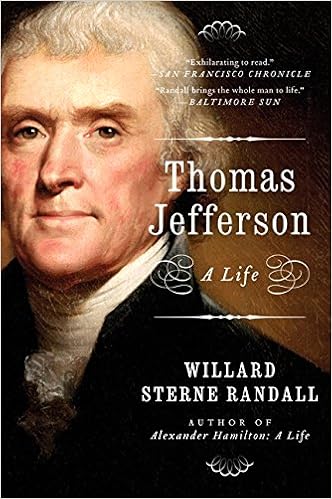Thomas Jefferson was highly critical of priests and orthodox religion. He felt priests were usually forces for conservatism and maintaining the status-quo of the privileged classes. Many of his political enemies claimed he was an atheist. On a political front, Thomas Jefferson was eager to create a separation of power between church and state. He argued that the State should not support a Religious sect.
“It is an insult to our citizens to question whether they are rational beings or not, and blasphemy against religion to suppose it cannot stand the test of truth and reason.”
To this end, he narrowly succeeded in passing the freedom of religious worship act in his home state of Virginia. It is worth bearing in mind that at the time, religious tolerance was not a widely accepted concept. Often states promoted one form of religion and those who dissented were subject to regulations. But, to Jefferson, religion had to be due to a person’s freedom of thought and action – otherwise it was meaningless.
“Difference of opinion is advantageous in religion. The several sects perform the office of a Censor morum over each other. Is uniformity attainable? Millions of innocent men, women, and children, since the introduction of Christianity, have been burnt, tortured, fined, imprisoned; yet we have not advanced one inch towards uniformity. What has been the effect of coercion? To make one half the world fools, and the other half hypocrites. To support roguery and error all over the earth.” (Notes on the State of Virginia, Query XVII)
Although he was critical of established religion, Jefferson makes frequent reference to his belief in the One Creator. It is clear that he held a firm belief in God, even if this God was not in the traditional image of God. Jefferson also believed that Jesus Christ was one of the greatest moral philosophers. Jefferson actually went so far as to create his own version of the Bible, which just consisted of the actual words of Jesus Christ. He removed references to miracles and his virgin birth (none of which he believed). He says of theThe Jefferson Bible:
“ Is a document in proof that I am a real Christian, that is to say, a disciple of the doctrines of Jesus, very different from the Platonists, who call me infidel and themselves Christians and preachers of the gospel, while they draw all their characteristic dogmas from what its author never said nor saw.”
Thomas Jefferson also took a great interest in educational matters. He took up a project to found the University of Virginia. This was the first and only university to be founded by an American president. It was also the first university to not be founded on religious principles. Jefferson considered his work at the University of Virginia to be one of his great achievements.
Jefferson was a rationalist who believed that the existence of God could be questionned as God would not mind people seeking in a spirit of genuine searching.
“Fix Reason firmly in her seat, and call to her tribunal every fact, every opinion. Question with boldness even the existence of a God; because, if there be one, he must more approve the homage of reason than of blindfolded fear. … Do not be frightened from this inquiry by any fear of its consequences. If it end in a belief that there is no God, you will find incitements to virtue in the comfort and pleasantness you feel in its exercise and in the love of others which it will procure for you.”
A sect of my own
“You say you are a Calvinist. I am not. I am of a sect by myself, as far as I know.” – Letter 1818
Unitarian
Jefferson is considered theologically to be close to Unitarianism. Unitarianism was not a formal institution at the time. But, they shared a belief in the moral values of Jesus but questioned the miracles, the Virgin birth, the doctrine of the Trinity and the pre-existence of Christ.
He wrote, “The Life and Morals of Jesus Christ” which became known as the Jefferson Bible, was Unitarian in theology. The Jeffersonian Bible was an edited version of the Bible, which contained only the teachings of Jesus.
“The doctrines of Jesus are simple, and tend all to the happiness of man.
1. That there is one only God, and he all perfect.
2. That there is a future state of rewards and punishments.
3. That to love God with all thy heart and thy neighbor as thyself, is the sum of religion.” – Jefferson
Jefferson said of Jesus Christ he offered:
“the most benevolent code of morals which has ever been offered to man
Thomas Jefferson: A Life
- Thomas Jefferson: A Life at Amazon.com
- Thomas Jefferson: A Life at Amazon.co.uk
Light and Liberty – Quotes of Thomas Jefferson
- Light and Liberty – Quotes of Thomas Jefferson at Amazon.com
- Light and Liberty – Quotes of Thomas Jefferson at Amazon.co.uk
Thomas Jefferson links


